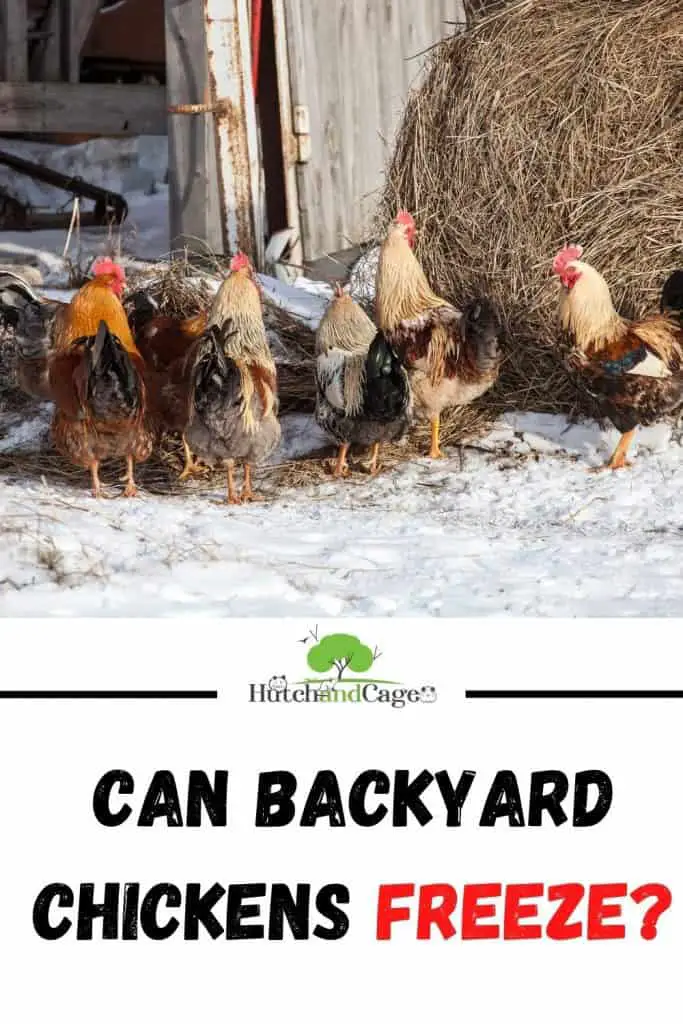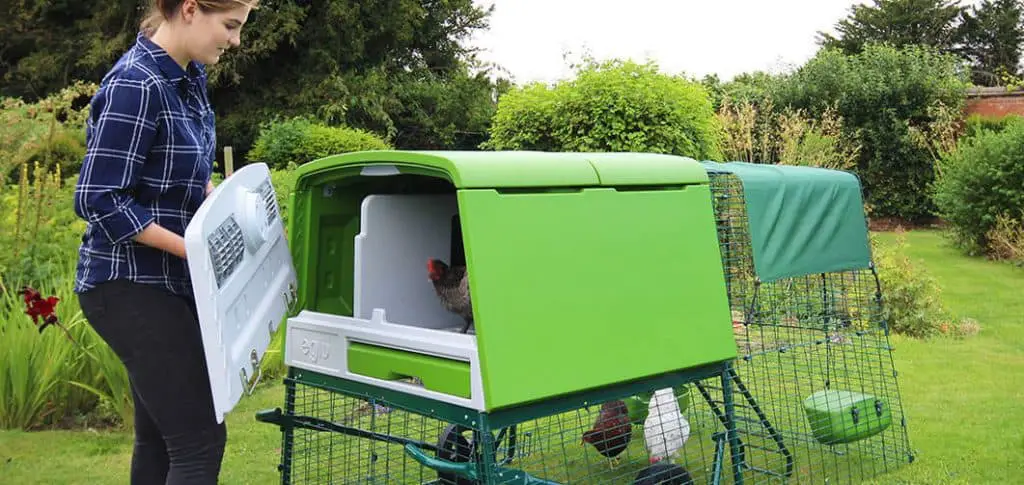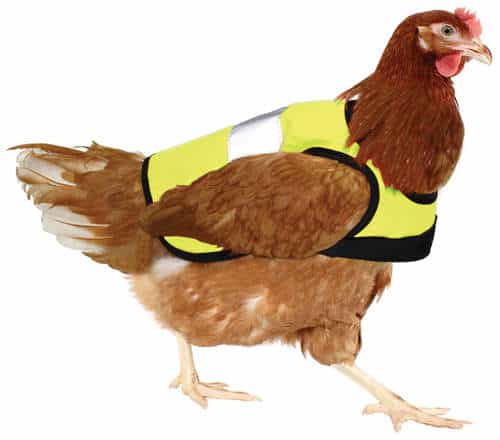Winter can be a difficult time to care for outdoor animals. When looking after backyard chickens, these colder months can cause problems to arise that are much less likely to occur during more temperate times.
Unfortunately, chickens can freeze to death. Although chickens are quite resilient to the cold, they can die if they aren’t in good health or their coop hasn’t been properly prepared for cold weather. Chickens can live in very cold conditions. However, try to maintain a temperature of around 65°-75°F inside the coop
Table of Contents
What Temperature is too Cold for Chickens?
You may be surprised at the temperatures your backyard chickens can withstand. Chickens can sometimes go down to temperatures as low as -20°F but it is highly recommended to avoid such extremes and instead to try and maintain a temperature of around 65°-75°F inside the coop.
This resilience comes from a couple of things. Firstly, chickens have a naturally high metabolism which will help their bodies to convert the energy from their food into heat to keep them warm.
Secondly, chickens can regulate their temperatures by making use of their plumage – which can help to trap air close to the body using their fluffy downy feathers that lie underneath their more firm contour feathers.

How Can I Prepare My Chicken Coop for Winter?
In cold weather, the coop for your backyard chickens will have to be up to the task of keeping your animals within a safe and comfortable temperature range. Whilst chickens are naturally rather good at regulating their temperatures, in the harsher times of year you will need to give them a helping hand.
Making sure that there are no cracks or gaps in the walls of your coop is important in winter preparation, as these cracks can let in drafts that will significantly affect the heat retention in the coop
The chickens will be able to maintain a good temperature inside the coop by using their combined body heat, however, if this heat they produce is just replaced with the cold air from outside the coop then all of their hard work will be for nothing. So when checking for breaches in the coop, make sure to be thorough and patch up, or cover, all that you find.

Ventilation is another essential in winter-proofing your coop, without it, there are a few unwanted things that can happen. A lack of ventilation can cause ammonia gas from chicken excrement to build up. This is something you don’t want to happen, as this gas build-up can cause damage to your chicken’s lungs.
Moisture will also evaporate from the chicken excrement and can then cause problems for the chickens by freezing on the wattle and combs of the birds as it condenses. Sometimes, even with ventilation, you may find that your chicken’s wattles and combs still freeze. A preventative measure for this would be to apply petroleum jelly to these areas as this can help stop the freezing.
Keeping the bedding in the coop dry is yet another important aspect of the winter-proofing. If you were to fail to maintain dry bedding within the coop, you could be allowing excess moisture to remain within which can increase the risk of mold and mold-related illness along with additional respiratory problems for the chickens.
Replacing any straw of sawdust bedding that has become damp with new, dry bedding will assist in alleviating this issue and create a better environment for your chickens.
During the winter you may find that individual chickens in your flock become unwell or aren’t doing too well in the cold. What you can do to help this chicken out in the winter would be to move it out of the coop and to somewhere warmer.
If you kept them in their own crate, this could be inside your house in a warmer room or maybe in a garage – just anywhere that this chicken can stay a little warmer and recuperate. After they are done healing up, you can reintroduce them to the coop.
Do Chickens Need a Heat Lamp in the Winter?
Your backyard chickens most likely won’t need the assistance of a heat lamp during the winter (if your coop is well proofed that is). The natural ability they possess to regulate their temperature with their plumage, along with using their body heat in combination as a flock, will usually mean there is little need for a heat lamp.
If there is extreme cold, however, or if your flock simply isn’t dealing with the colder weather very well, you may find a heat lamp to be useful.
Before you make use of a heat lamp, you should check your flock to see if the cold weather is stressing them. You can tell if the cold is stressing your chickens if your flock are: huddled together in one corner of the coop; puffing up their feathers to try and trap more body heat within; standing only on one leg at a time to try and keep them warm; making excess noise.
Cozy Products CL Safe Chicken Coop Heater 200 Watts Safer Than Brooder Lamps, One Size, Black
$47.99 in stock
Features
- Chicken Coop Heater: Keep your birds warm and prevent frostbite with Cozy Products Cozy Coop is a radiant heater that provides consistent, gentle heat without overheating your pets, making it ideal for outdoor coops and freezing winter temperatures.
- Safe to Use: Our chicken coop heater is ETL-listed and rated for zero clearance, reducing energy consumption, fire hazards, and circuit breaker issues. Safer than brooders or heat lamps, it has a built-in thermal protector for additional safety.
- Energy-Efficient Heater: Using about 13% (200 watts) of the electricity of a standard 1,500-watt space heater, this heater is energy-efficient and saves you energy costs. The heater has a durable, protected electric cord that keeps your chickens safe.
- Flat Panel Design: The ultra-flat design of the radiant heater requires no light bulbs or lamps to replace; it can be plugged into a power source to keep your dogs, cats, chickens, ducks, or birds warm. You can mount it on a wall with a convenient stand.
- User-Friendly Features: With its large, high-visibility ON or OFF switch and in-cord switch for fingertip control, our outdoor heater is easy to use. The chicken coop heating mat has an attractive design and can heat the surface up to 170°F.
Taking the temperatures of the coop, along with the chickens themselves, can also let you know whether or not you need heat lamps. You can use a thermometer to take a reading of the ambient temperature within the coop. If this temperature was to read more than 15 degrees below the optimal 65°-75°F, then you may want to consider some heat lamps.
You can inspect the temperature further by getting an individual reading from one of your chickens. Using an infrared thermometer would be an easy way to do this, simply place the thermometer on the skin of the chicken’s face (not the comb or wattle) and then add around another 3°-4°F to get the core temperature of the chicken. If the reading is below around 105°F then this could also mean you need a heat lamp.


When installing heat lamps, you should make sure that they are kept well away from any combustible materials. In the case of your coop, this would mean having them on the roof and therefore away from the straw and bedding that will be on the floor of the coop – the last thing you want is to have a coop fire and risk harming your flock.
You should also make an effort to make sure that any cords for the lamps are not in a position in which any of the chickens could become entangled or that allow for the cords to be pecked at.
Another consideration to make could be the amount of headlamps you need. Having at least 2 is a good idea, as this means that if one were to fail during the night then there would at least still be one left to keep the flock warm until the morning comes and it can be repaired.
Wear a coat
Yes, I know this looks and sounds ridiculous but yes, jackets for chickens are a real thing. Through the night your chickens should be locked away, safe and sound from the cold and predators.
But if you’re worried about your chickens throughout the day. Don’t panic, because the Hi-Viz chicken jackets have arrived. Available in two colors, pink and yellow, or as a twin-pack, this health and safety gilet will make your pets visible on the darkest days while protecting them from the rain and sleet.

The High-Vis Chicken Jacket is easy to use. Just gently put your chicken’s wings through the arm holes and fasten at the front. The velcro fastening is adjustable, allowing for the perfect fit so that your hen is comfy and the jacket contains an inner bodywarmer for insulation.
The High-Vis Chicken Jacket:
- Offers excellent comfort and protection in cold weather
- Breathable, showerproof fabric
- Adjustable velcro fastening, offering comfort and extreme maneuverability
- 180 degree, wide reflective strip visible from the air
- Offers protection from dirt
Please note, the High-Vis Chicken Jacket is not suitable as pajamas – please remove at night.
Is it Safe for Chickens to be Out in the Snow?
During cold weather you may be worried that your backyard chickens cannot be active enough if they are spending most of their day in the warmth of the coop. Chickens can be out in the snow, provided it isn’t snowing heavily and the temperatures aren’t low enough to cause them discomfort or damage from exposure.
It’s perfectly okay to allow your flock out to forage a little when it has been snowing and this foraging can provide a good bit of exercise for your chickens – to keep them in shape during the winter.
One thing you may notice about your chickens, when it has been snowing, is that they don’t like to walk directly on the snow itself. They may not mind being in the snow, as long as they are not having to put their feet on it.
One way you can allow your chickens to roam a little more freely in the snow is to provide them with pathways of straw or sawdust so that they don’t have to get their feet so cold in the winter weather. After you have laid some of the straw down you should see that your chickens don’t walk about in the snow anymore.
The only other concern should be making sure after they have been out, that you make sure they are all rounded up and kept snug inside the coop for the night.
What temperature is too cold for chickens?
Chickens can survive in temperatures below freezing. That’s not to say you should leave them outside in those temperatures, but by giving them a coop with good ventilation, freshwater, and plenty of bedding, they can easily survive in the cold winter months.
How Can you tell if chickens are too cold?
You can easily tell a chicken is too cold just by looking at them. If they have ruffled up their feathers, and are perched on a roost with one leg tucked into their body, they are too cold. These are both signs that your chickens are trying to conserve heat.
Can chickens sleep outside in the cold?
In cold weather, your chickens really shouldn’t be sleeping anywhere besides their coop. It can take as little as 10 minutes for a chicken to freeze to death, and not having somewhere warm to sleep could lead to the loss of an entire flock.
Do chickens need heat lamps in the winter?
Your chickens don’t need a heat lamp. As long as your coop is well ventilated, and you have plenty of bedding, your chickens will be able to warm up by themselves. If you feel the need to use a heat lamp, make sure it’s set to only a few degrees warmer than outside. If the coop is too warm and the outside is too cold, your chicken won’t be able to regulate their temperature.
Can chickens sleep outside in the rain?
Chickens can, and sometimes will sleep outside in the rain. If it’s raining, your chickens should have somewhere to roost so they can keep their feet dry. This roost should also have overhead protection to keep owls and predatory birds away.
Conclusion – Can Chickens Freeze to Death?
To summarise, chickens can freeze to death. With the proper preparations, however, this should prove to be a very unlikely occurrence. The natural resilience of the bird, heat retention and regulation provided by the chicken’s plumage in combination with a well cold-proofed coop, will surely see your flock through the winter.
They can even venture out during the day if they would like (given you make sure to round them all up after they’re done). If all is order you’ll have yourself a cosy coop of chickens that’ll make it through the cold with no issues.





